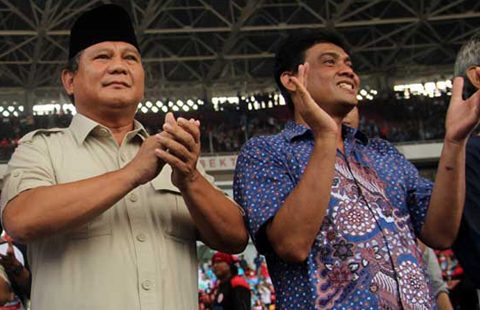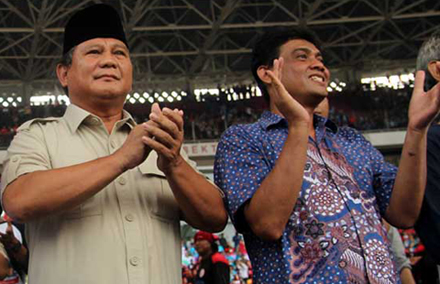Indonesia’s first May Day holiday in decades was less about labour and more about presidential politics, write Teri Caraway and Michele Ford.
It may have been the first time in decades that May Day was a public holiday in Indonesia, but it was the presidential elections rather than wages and conditions that stole the spotlight last Thursday.
In Bung Karno Stadium, the charismatic leader of the Federation of Indonesian Metalworkers’ Unions and president of the Confederation of Indonesian Trade Unions, Said Iqbal, nailed his political colours to the mast.
After months of speculation, Iqbal declared his support for Prabowo Subianto in the presidential elections. His position is clear and uncompromising: one media report even quoted him as saying that getting close to Jokowi in the lead-up to the presidential elections would be like approaching the angel of death.
https://www.youtube.com/watch?v=s5YFYY4cZJA (Orasi Politik Said Iqbal pada Hari Buruh 1 Mei 2014)
Iqbal’s support is contingent on Prabowo signing a political contract that includes meeting ten demands, several of which relate to classic labour issues such as wage levels, pensions, healthcare, outsourcing, a better deal for honorary teachers and better protection for domestic workers at home and overseas. The others deal with broader issues affecting workers including universal social security, public transport and affordable housing, compulsory schooling and bursaries for workers’ children. There was also a plug for the cancellation of the Mass Organisations law. These demands reflect the policy-driven approach for which Iqbal is famous, and which has underpinned FSPMI’s success. Word has it that the political contract is also likely to include a Ministerial position for Iqbal in the case of a Prabowo win – and not just any ministry but the Ministry for Manpower and Transmigration, where he would have significant influence over labour policy.
The question on everybody’s lips is, of course, ‘Why Prabowo?’ Activists in the human rights movement are dismayed that such a key figure in the labour movement would line up behind him, especially – as one report noted – since the hard-won freedom to organise that unionists now enjoy was wrested by activists who were killed or went missing when Prabowo was calling the shots. There is the additional problem of labour practices in Prabowo’s own businesses: in one well-publicised case, six hundred workers in a paper factory linked to Prabowo have not been paid wages since last September.
Leaders of Indonesia’s other main union confederations have also questioned Iqbal’s judgement. Mudhofir, the leader of KSBSI (the confederation that grew out of the Muchtar Pakpahan-led alternative union of the late Suharto period), has come out strongly against Prabowo, telling the press that his union doesn’t want to be led by a president responsible for human rights violations. KSBSI officially declared for Jokowi in late March. It’s no surprise, given his PDI-P links, Andi Gani, the leader of a major faction within the legacy confederation, KSPSI, also supports Jokowi as the PDI-P candidate.
Defending his position, Iqbal – who supported Jokowi’s push for governor – explained that a political contract had been offered to several likely presidential contenders, including Jokowi, but only Prabowo had expressed any real interest. Prabowo also accepted invitations to address union members on several occasions where Jokowi was also invited to speak, but chose not to attend.
Is Iqbal’s support for Prabowo then nothing more than a fit of pique, driven by frustration in the face of Jokowi’s lack of attention? In Iqbal’s defence, Jokowi may spend a lot of time with the city’s poor, but he hasn’t exactly been a champion of formal sector labour. He has made public statements on key issues like outsourcing (saying that the letter of the law needed to be followed), and recently attended the launch of an organisation called Relawan Buruh Sahabat Jokowi, which claims to be mobilising four million workers as part of his tim sukses.
https://www.youtube.com/watch?v=lHPguNnz-2g (Jokowi Resmikan Klub Buruh Pendukung Jokowi)
But he is also on record as being not particularly impressed about the money spent on May Day celebrations, an obvious sideswipe at Iqbal’s glamour event. The money, Jokowi said, would be better used buying an ambulance to collect wounded workers. He also asked that workers stay off the streets last Thursday and – in language that harks back to the New Order – urged workers to discuss their problems with their bosses (bermusyawarah) rather than demonstrating for their rights. KSPSI echoed this view: ‘We don’t always have to demonstrate on May Day. This year we want to focus on working with the community.’ Instead of a rally, the union held a blood drive.
Jokowi has hedged his bets by saying that he’d make workers more prosperous if he was elected. But his record on that front is not great. One of the things that Iqbal has criticised Jokowi for is the handling of provincial wage negotiations in the 2014 round, which he said demonstrated a lack of seriousness in dealing with labour. In the 2013 wage round, Jokowi had signed off on an increase of nearly 50 per cent. But this year saw an increase of just 10 per cent to IDR 2.441 million, or just AUD 228 per month. A smaller increase may seem prudent after such a big jump. But 10 per cent amounts to very little in a year when inflation sat at over 8 percent. Perhaps even more significantly Jokowi’s decision meant that Jakarta wages dropped below that of the satellite industrial areas of Karawang, Bekasi District and Bekasi City.
Others not associated with Iqbal or KSPI have also expressed disappointment on this front. Two of the sectoral unions in the status-quo confederation mounted a protest in front of city hall on Thursday about his handling of negotiations around sectoral wages. When unions and employers reached a deadlock on sectoral wages for electric cable workers, they were negotiating in the range of IDR 2.80-2.85 million (AUD 262-263) per month. Jokowi signed off on a figure of IDR 2.70 million, significantly below what employers had indicated they were prepared to pay. It appears that in terms of putting his money where his mouth is on workers’ welfare, Jokowi may not be as committed as he suggests.
Aside from potentially signing the 10-point political contract and a ministerial post for Iqbal, what is Prabowo offering to labour? Prabowo’s sales pitch to labour was evident in his 27-minute speech, which deployed nationalist and populist rhetoric.
https://www.youtube.com/watch?v=UH73XrMKxUI (Orasi Prabowo pada Hari Buruh 1 Mei 2014)
He condemned poverty and made a plug for free education and social mobility after a long rant about Indonesia’s wealth and its social and economic inequality. It’s hard to believe that the hypocrisy of these statements was entirely lost on the audience. Clean elections, the problems of corruption and of politicians selling the family farm to foreigners also got a mention as problems that desperately need to be addressed. Prabowo then played to the audience, congratulating them on the quality of their leadership and urging unions to take a decisive role in determining Indonesia’s future. He also acknowledged the plight of honorary teachers and reminded those present that five years ago he was the only prominent politician prepared to sign an anti-outsourcing pledge. He concluded his address to the unions by saying that he hoped within days to issue a joint declaration with union leaders signalling his commitment to workers, farmers, fishers, teachers and small traders, as a ‘soldier of the Indonesian people’ (prajurit rakyat Indonesia).
What such a commitment would translate into if he wins office is an open question. Iqbal’s influence as minister would depend greatly on his relationship with Prabowo, and in turn Prabowo’s capacity to make his party and coalition partners fall in line. The realpolitik of government will be a huge challenge to Iqbal’s reformist reputation even if Prabowo surprises observers and delivers on his promises. Iqbal’s gambit will also likely prove to be divisive within the union. Jokowi is popular among workers, and many members may choose to ignore their national leader and vote for Jokowi. When campaigning with workers, the immensely popular PDI-P legislator Rieke Diah Pitaloka, who is renowned for her dedication to labour causes, often accompanies him. Her position within PDI-P has made her a front-runner for the ministerial position should Jokowi win. Indeed, the intense competition within PDI-P for that position – Andi Gani of KSPSI and the well-known activist Teten Masduki are also rumoured to be contending for the slot – has led some observers to conclude that Iqbal’s backing of Prabowo has more to do with ministerial ambitions than with policy.
What is clear from the political manoeuvring around May Day this year is that it was not a day on which labour showed its unity. Instead, Thursday’s events made all the more apparent the deep divisions in the labour movement. The stakes for Iqbal are particularly high. He is not one for playing it safe, a tactic that to date has paid off and that has made the labour movement both more effective and visible on the national stage. No matter how things turn out in August, however, he risks losing the some of the cache he’s developed as the leading figure in the reconstruction of the Indonesian labour movement. If Prabowo loses, Iqbal must explain to his supporters why he made the strategic error of supporting a candidate that consistently polled behind Jokowi. If Prabowo wins, he will have to fight hard to make sure that Prabowo keeps his promises, some of which will surely be broken, providing fodder to those who disagreed with the endorsement. For now, Iqbal is walking a tightrope and those who care about the Indonesian labour movement are holding their breath.
Teri Caraway (caraway@umn.edu) is a comparative political scientist at the University of Minnesota, who has a special interest in Indonesian labour.
Michele Ford (michele.ford@sydney.edu.au) is ARC Future Fellow and Director of the Sydney Southeast Asia Centre at the University of Sydney, where she researches Southeast Asian labour movements and trade union aid.
 Facebook
Facebook  Twitter
Twitter  Soundcloud
Soundcloud  Youtube
Youtube  Rss
Rss 
